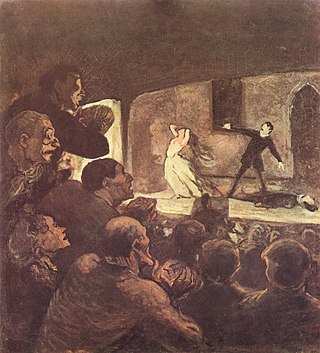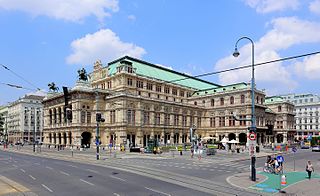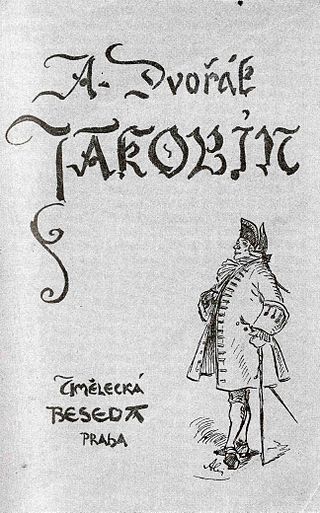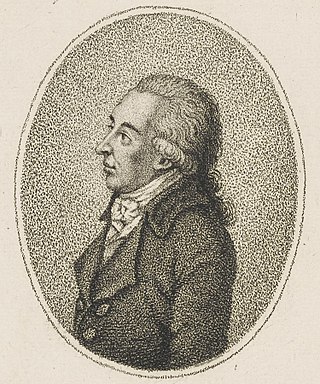Related Research Articles
Pygmalion or Pigmalion may refer to:

Friedrich Wilhelm Gotter was a German poet and dramatist.

A modern melodrama is a dramatic work in which the plot, typically sensationalized and for a very strong emotional appeal, takes precedence over detailed characterization. Melodramas typically concentrate on dialogue that is often bombastic or excessively sentimental, rather than action. Characters are often flat, and written to fulfill established character archetypes. Melodramas are typically set in the private sphere of the home, focusing on morality and family issues, love, and marriage, often with challenges from an outside source, such as a "temptress", a scoundrel, or an aristocratic villain. A melodrama on stage, filmed, or on television is usually accompanied by dramatic and suggestive music that offers further cues to the audience of the dramatic beats being presented.

Opera in German is that of the German-speaking countries, which include Germany, Austria, and the historic German states that pre-date those countries.

Józef Antoni Franciszek Elsner was a Polish composer, music teacher, and music theoretician, active mainly in Warsaw. He was one of the first composers in Poland to weave elements of folk music into his works.

Jakobín, or The Jacobin, is an operatic pastoral comedy in three acts by Antonín Dvořák, his Opus 84. Its Czech libretto by Marie Červinková-Riegrová employs characters from Alois Jirásek's story At the Ducal Court but in a plot of her devising. The opera's first performance took place on 9 February 1889 at the National Theatre in Prague with Adolf Čech conducting; it was however revised by both librettist and composer and premiered again, under Čech, on 19 June 1898, with notable adjustments to the last act, in the version that has since been standard.

Georg Anton Benda was a composer, violinist and Kapellmeister of the classical period from the Kingdom of Bohemia.

Johann Friedrich Reichardt was a German composer, writer and music critic.
Opera is an art form in which singers and musicians perform a dramatic work, which combines a text and a musical score. Opera is part of the Western classical music tradition. While the scale of opera can be larger or smaller—there are many different genres of opera—performance typically involves different types of artist and technical staff. Usually an orchestra led by a conductor accompanies the singers. In contrast to spoken theatre, the opera world is international. Italian, German, French, English, and Russian works are performed worldwide in their original languages, and artists travel from country to country performing.
Michael Maddox was an English entrepreneur and theatre manager active in Imperial Russia. He was co-founder, with Prince Urusov, of the Petrovsky Theatre, the first permanent opera theatre in Moscow and predecessor of the Bolshoi Theatre.
A monodrama is a theatrical or operatic piece played by a single actor or singer, usually portraying one character.

Romeo und Julie is a singspiel in three acts by composer Georg Benda. The opera has a German libretto by Friedrich Wilhelm Gotter that is based upon Christian Felix Weiße's translation of Shakespeare's Romeo and Juliet.

Ariadne auf Naxos is a duodrama in one act by Czech composer Georg Benda with a German libretto by Johann Christian Brandes. It was commissioned by Abel Seyler, whose theatrical company arrived in Gotha in 1774. The opera's first performance was at the Schloss Friedenstein, Gotha, on 27 January 1775.

Pygmalion is a monodrama in one act by composer Georg Benda with a German libretto by Friedrich Wilhelm Gotter. The opera's first performance was at the Ekhof Theatre, the court theatre in Gotha, on 20 September 1779. Pygmalion was the fourth of the five theatrical collaborations of Benda and Gotter. Gotter based his text on Jean-Jacques Rousseau's 1762 play Pygmalion. Benda's melodrama is unusual as it has no singing roles. Two of the three characters, Pygmalion and Galatea, are spoken roles; the other, Venus, is silently acted on stage.

Medea is a melodrama in one act with five scenes by Bohemian composer Georg Benda with a German libretto by Friedrich Wilhelm Gotter. The work was first performed in Leipzig at the Theater am Rannstädtertor on 1 May 1775.
The Stronger is an opera in one act by composer Hugo Weisgall. The English-language libretto by Richard Henry Hart is based on August Strindberg's 1889 play of the same name. It premiered at the White Barn Theatre in Westport, Connecticut, on August 9, 1952 and was dedicated to that theatre's founder, the actress Lucille Lortel.

Friedrich Wilhelm Rust was a German violinist, pianist and composer. He hailed from a renowned musical family in Germany. He was the father of the pianist and organist Wilhelm Karl Rust and the grandfather of Thomaskantor, composer and Bach scholar Wilhelm Rust.
Jiří Čart was a Bohemian composer, violinist and flautist of the late baroque period.

Esther Charlotte Brandes, was a German actress and opera singer.
References
- ↑ Warrack, John and West, Ewan (1992), The Oxford Dictionary of Opera, 782 pages, ISBN 0-19-869164-5